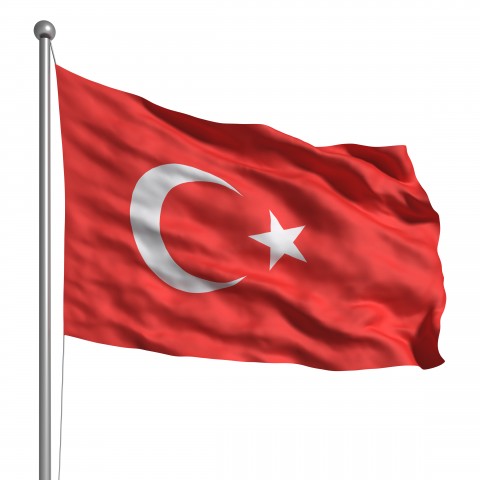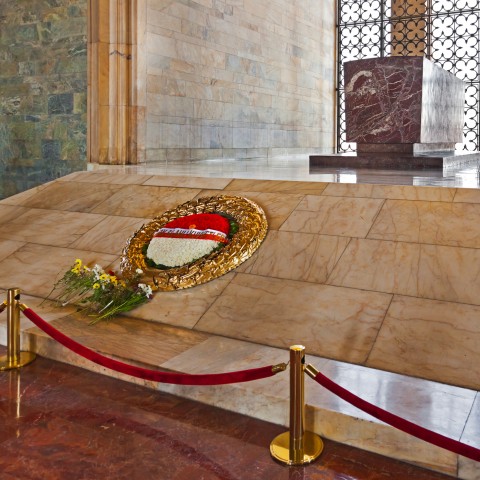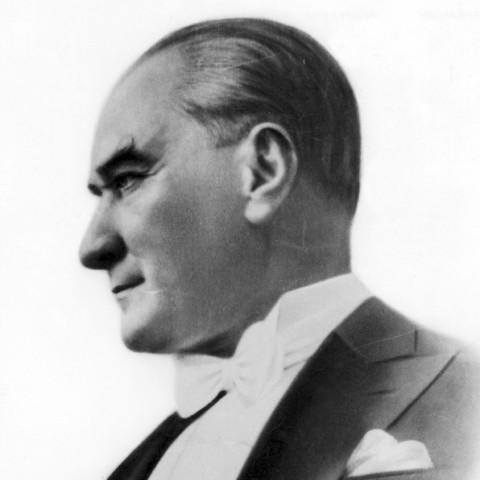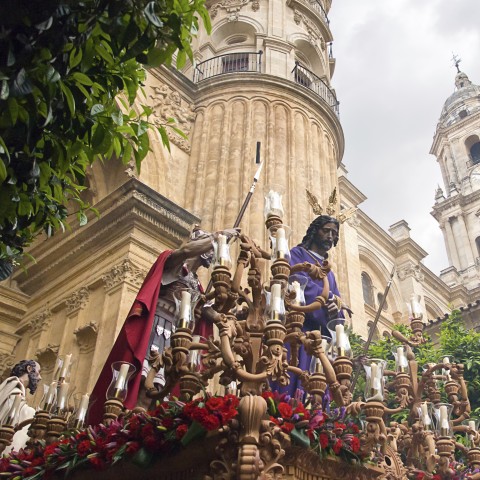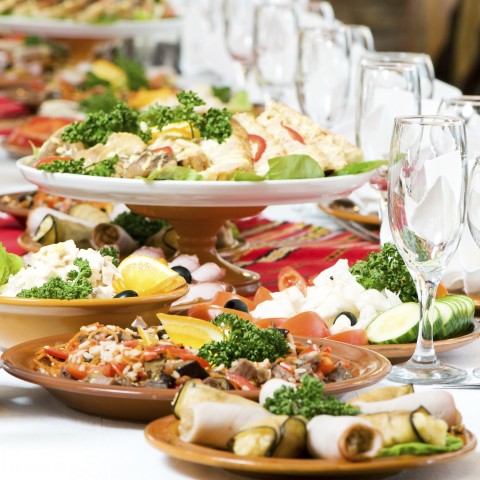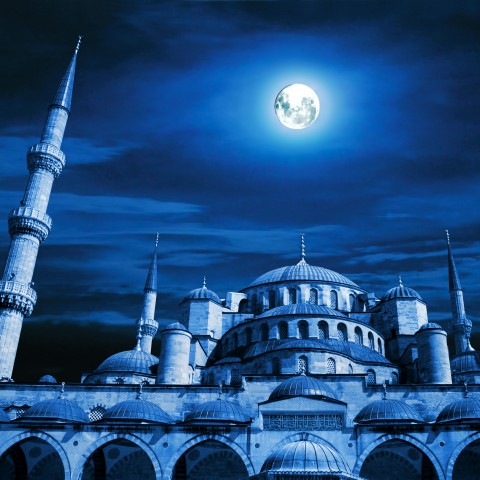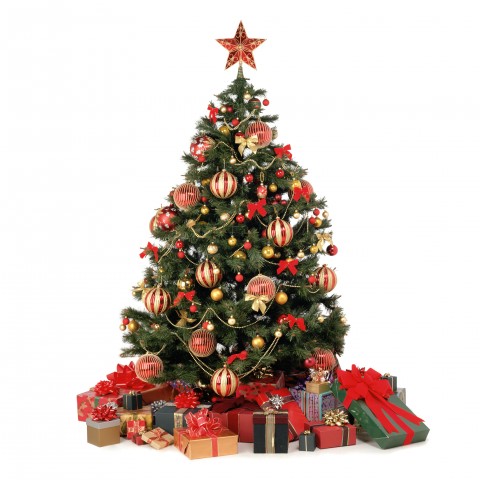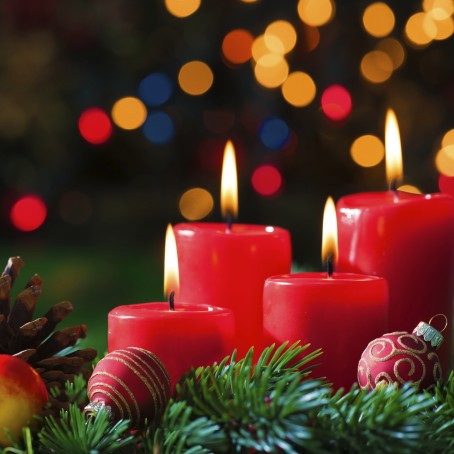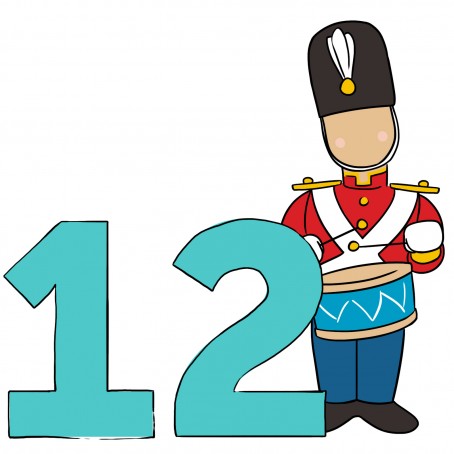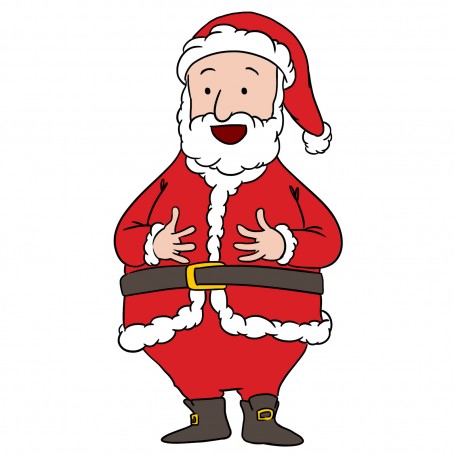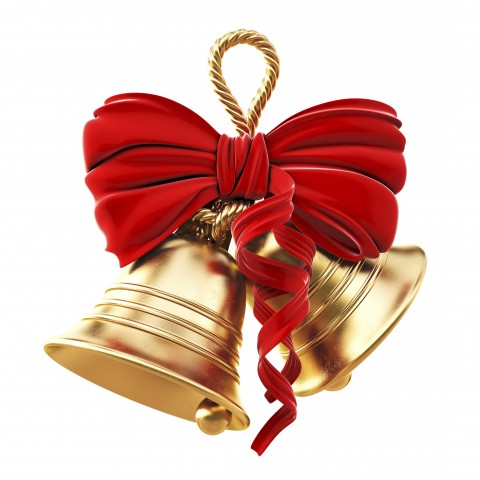
Flags and national anthems are the two most important tokens of the representation of national identities. However, since national anthems consist of lyrics and music, it’s a little more effective in getting the feelings across. The lyrics usually express a country’s power, independence, and patriotic sentiments, which touch people’s hearts deeply. Furthermore, with the help of music and the act of singing, the nation becomes as one heart, which beats as one together.
Every national anthem is unique and has its own story behind it. Would you like to know the history of the Turkish national anthem? What is the national anthem of Turkey called? How about learning the Turkish national anthem’s lyrics in English?
 Table of Contents
Table of Contents
- Vocabulary Relevant to National Anthems
- History of Turkish National Anthem – ‘İstiklal Marşı’
- Lyrics of İstiklal Marşı
- Where, When, and How is the Turkish National Anthem Sung?
- All about Turkish Language and Turkish Culture
1. Vocabulary Relevant to National Anthems
| Turkish | English |
| Milli | “National” |
| Marş | “March” |
| Bayrak | “Flag” |
| Saygı | “Respect” |
| Ceremony | “Tören” |
| Geçit töreni | “Parade” |
| Vatansever | “Patriot” |
| Vatanseverlik | “Patriotism” |
| Official | “Resmi” |
| Güfte/söz | “Lyrics” |
| Orkestrasyon | “Orchestration” |
| Beste | “Composition” |
2. History of Turkish National Anthem – ‘İstiklal Marşı’
1. Content and the origin of content
Turkish history goes back thousands of years, and the rule of theOttoman Empire is a significant period. Upon the defeat of the Ottoman Empire at the end of World War 1, some regions of the Ottoman Empire were occupied by other countries. In 1919, the War of Independence was started to ensure and protect the integrity of the country. This war ended successfully in 1923 and led to the establishment of the Republic of Turkey.
In 1921, it was announced in the nation that an original National March was going to be selected and awarded in a competition. The aim was to motivate the battling military forces and to encourage and honor the whole nation for an independent land at the end of the war.
724 poems took part in the competition. However, none of them were found to be suitable as a National March.
It was realized that Mehmet Akif Ersoy, who was a famous poet at that time, hadn’t participated in the competition. He hadn’t sent a poem because he disapproved of the fact that there was a monetary reward for the winner.
The National Parliament convinced him to write and present a poem and ignore the prize. Finally, he sent his poem, which consisted of 10 verses. He expressed his confidence in the courage and self-sacrifice of the Turkish soldiers and the Turkish nation’s commitment to independence, God, homeland, and religion in this poem. He was, basically, referring to the Turkish War of independence.
2. Adoption and the lyricist
Mehmet Akif Ersoy’s poem, which was titled İstiklal Marşı (“Independence March”), was adopted as the Turkish National Anthem on March 12th, 1921, before the establishment of the Turkish Republic.
Do you know what happened to the reward he was entitled to? It was donated to a foundation, which provided poor women and children with new skills so that they could find jobs and make some money.
3. Composer and Orchestrator
After the adoption of the lyrics, there was a Turkish national anthem composer competition for the musical composition of the poem. 24 composers participated in this competition. However, due to the war in the country, there was no time to evaluate the results. Therefore, the poem was sung differently in the country’s different regions.
In 1924, Ali Rıfat Çağatay’s composition was selected. His music was used until 1930. Then, the composition, prepared in 1922 by Osman Zeki Üngör, the conductor of the Presidential Symphony Orchestra, started being used. However, it’s claimed that this music was composed for some other lyrics, not for the İstiklal Marşı.Later on, it was orchestrated by Edgar Manas.

3. Lyrics of İstiklal Marşı
İstiklal Marşı consists of 10 verses. Only verses 1 and 2 are sung as the National Anthem!
Please note that the words “the star and the crescent,” which are mentioned a few times in the poem, represent the star and the crescent on the Turkish flag.
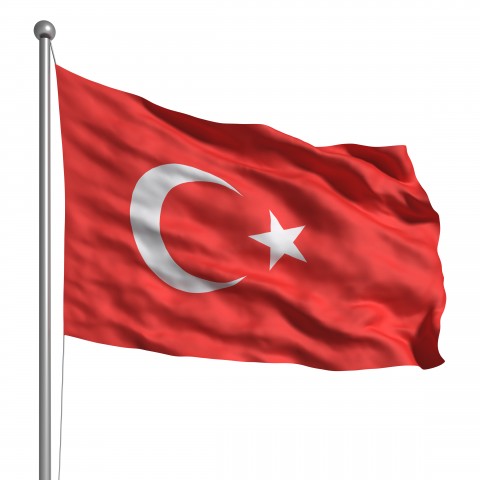
Below, you can find the Turkish national anthem in English. Please note that the Ministry of Foreign Affairs of Turkey has translated the first two verses below. The remaining 8 verses below have been translated by Assoc. Prof. Dr. Günil Özlem Ayaydın Cebe.
| 1 | Korkma, sönmez bu şafaklarda yüzen al sancak; Sönmeden yurdumun üstünde tüten en son ocak. O benim milletimin yıldızıdır, parlayacak; O benimdir, o benim milletimindir ancak. | Fear not, the crimson flag, waving in these dawns will never fade Before the last hearth that is burning in my nation vanishes. That is my nation’s star, it will shine; That is mine, it belongs solely to my nation. |
| 2 | Çatma, kurban olayım çehreni ey nazlı hilâl! Kahraman ırkıma bir gül… ne bu şiddet bu celâl? Sana olmaz dökülen kanlarımız sonra helâl, Hakkıdır, Hakk’a tapan, milletimin istiklâl. | Oh coy crescent, do not frown for I am ready to sacrifice myself for you! Please smile upon my heroic nation, why that anger, why that rage? If you frown, our blood shed for you will not be worthy. Freedom is the right of my nation who worships God and seeks what is right. |
| 3 | Ben ezelden beridir hür yaşadım, hür yaşarım. Hangi çılgın bana zincir vuracakmış? Şaşarım! Kükremiş sel gibiyim; bendimi çiğner, aşarım; Yırtarım dağları, enginlere sığmam, taşarım. | I have been free since eternity, and free shall I be. What fool dares to shackle me? I defy the temerity! I am like a roaring flood; I overflow trampling down my banks, I tear apart mountains, surge into depths, and surpass. |
| 4 | Garb’ın âfâkını sarmışsa çelik zırhlı duvar; Benim iman dolu göğsüm gibi serhaddim var. Ulusun, korkma! Nasıl böyle bir îmânı boğar, “Medeniyet!” dediğin tek dişi kalmış canavar? | Western horizons may be encircled by walls armored in steel But I have my chest brimful of faith as my homeland’s frontier. Let it howl, fear not! How can it smother such solid faith That single-fanged monster, “Civilization!” as you call it? |
| 5 | Arkadaş! Yurduma alçakları uğratma sakın; Siper et gövdeni, dursun bu hayâsızca akın. Doğacaktır sana va’dettiği günler Hakk’ın… Kim bilir, belki yarın… belki yarından da yakın. | My friend! Never ever let the dastards into my land! Render your body a shield; bring this heinous raid to an end. For soon shall break the blissful days God promised, for sure; Perhaps tomorrow, who knows, perhaps even sooner than that. |
| 6 | Bastığın yerleri “toprak!” diyerek geçme, tanı! Düşün altındaki binlerce kefensiz yatanı. Sen şehîd oğlusun, incitme, yazıktır atanı; Verme, dünyâları alsan da, bu cennet vatanı | Do not assume what you tread on is mere “earth”, recognize it! Think of the thousands, without shrouds, lying beneath. You’re the son of a martyr, take shame, hurt not your ancestor; Cede not this heavenly homeland, even if it’s the worlds you’re granted. |
| 7 | Kim bu cennet vatanın uğruna olmaz ki fedâ? Şühedâ fışkıracak, toprağı sıksan şühedâ! Cânı, cânânı, bütün varımı alsın da Hudâ, Etmesin tek vatanımdan beni dünyâda cüdâ | Who would not offer his life for this homeland of paradise? Martyrs would pour forth, all martyrs, should one simply clutch the earth! If God will, He may take my life, my beloved, and my wealth, But may He not, for the world, just deprive me of my homeland. |
| 8 | Ruhumun senden, İlâhî, şudur ancak emeli: Değmesin ma’bedimin göğsüne nâ-mahrem eli! Bu ezanlar-ki şehâdetleri dînin temeli Ebedî yurdumun üstünde benim inlemeli | The sole wish of my soul, oh glorious God, from You is that, No heathen would ever, on the bosom of my temple, lay hand! These calls to prayer, whose testimonies are the ground of religion, Should resound far and wide over my eternal homeland. |
| 9 | O zaman vecd ile bin secde eder –varsa- taşım; Her cerîhamdan, İlâhî, boşanıp kanlı yaşım, Fışkırır rûh-i mücerred gibi yerden na’şım; O zaman yükselerek Arş’a değer, belki başım. | Then, my tombstone, if any, prostrates in rapture a thousand-fold, Of my every wound, oh glorious God, tears of blood gush forth, And out spurts my corpse, in pure spirit, from the ground, Perhaps then, shall ascend and to the heavens touch my crown! |
| 10 | Dalgalan sen de şafaklar gibi ey şanlı hilâl; Olsun artık dökülen kanlarımın hepsi helâl. Ebediyen sana yok, ırkıma yok izmihlâl: Hakkıdır, hür yaşamış bayrağımın hürriyet; Hakkıdır, Hakk’a tapan milletimin istiklâl! | So ripple and wave, like dawning skies, oh glorious crescent, So that every drop of my blood finally be blessed and worthy! Neither you nor my race shall ever be annihilated, For my flag, who has lived ever freely, has the right to liberty; For my nation, who worships God, has the right to independence! |
4. Where, When, and How is the Turkish National Anthem Sung?
1. Occasions
There is more to know about the Turkish national anthem. Let’s see when and where it’s played and sung.
1. At the beginning of the ceremonies of the official holidays,
2. At the welcoming and farewell ceremonies of the presidents of other countries,
3. At the welcoming and farewell ceremonies of the high-ranking commanders,
4. At the flag hoisting and lowering ceremonies,
5. In the reception of foreign ambassadors and other diplomats,
6. At the beginning of the ceremonies held in military units, schools, and institutions,
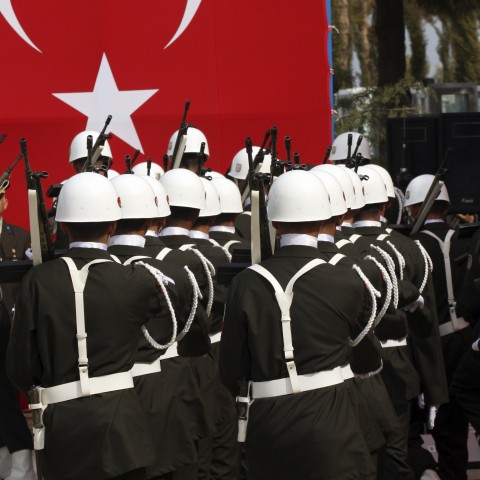
7. In special ceremonies where the president of the Turkish Republic will be present,
8. At the start and end times of radio and television broadcasts,
9. At the beginning of the association board meetings,
10. At the flag ceremonies held in schools (Every Monday morning and Friday afternoons and on special days),
11. At the military oath of enlistments,
12. In the visits of the statesmen to Anıtkabir (Ataturk‘s monumental tomb) and in other cases Anıtkabir visits,
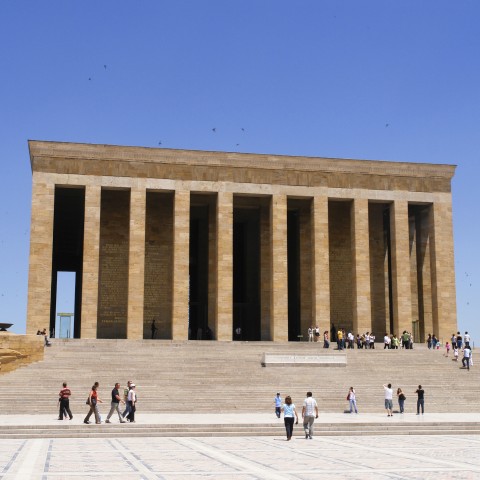
13. At medal ceremonies,
14. In international sports games,
15. In the farewell of martyrs,
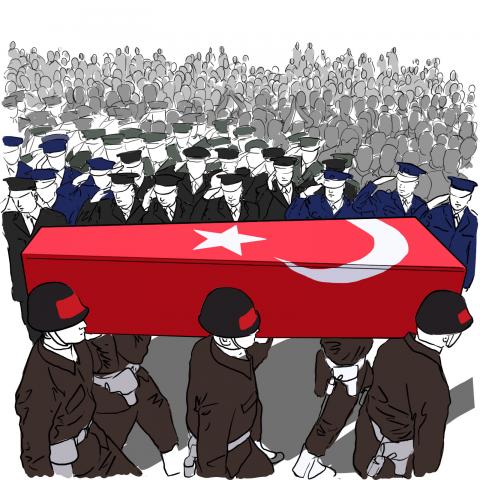
16. At state ceremonies,
17. In sports games,
18. In oath ceremonies and other ceremonies of military schools, unions and institutions,
19. Before the ceremonies and meetings of various parties, associations and organizations, etc.
2. National Anthem Etiquette in Turkey
Every country has its own national anthem etiquette. Here is what you should and shouldn’t do when the Turkish anthem is played:
1. Everyone must stop.
2. Everyone must stand up.
3. Everyone must stand at attention. (Straight, with feet together and arms by the sides)
4. Civilians have to take their hats off.
5. No eating, no talking, and no moving around during the march.
6. It must be sung in a respectful way.
One more piece of extra information about the Turkish anthem:
The lyrics of the Turkish national anthem, the Turkish flag, and the picture of Ataturk, the founder of the Turkish Republic, are framed and hung on the walls of every classroom in Turkey.
5. All about Turkish Language and Turkish Culture
In this article, you found out the answer to the question: “What is the name of the national anthem of Turkey?” Then you learned other facts about the Turkish national anthem, such as the Turkish national anthem’s lyrics in English, the history of the Turkish national anthem, the Turkish national anthem’s composer, and the national anthem etiquette in Turkey, etc. However, there is a lot more to know about Turkish culture and the Turkish language.
Therefore, visit TurkishClass101, which has numerous audio recordings, tons of vocabulary lists, and free resources, including the dictionary you can refer to, to get a better grasp of the Turkish language and its culture.
Don’t forget that there is also MyTeacher, which is the premium service of TurkishClass101 that you can use to practice with a private teacher.
Do you know what is also good about it? You can download the app for free and use it wherever you are.
Last but not the least, please continue to provide us feedback about all the resources provided at TurkishClass101!
A Brief Overview of Turkish Culture and Traditions

Turkey is a country straight from the depths of history, with empires dating back 4000 years. The course of time and events has introduced Turkey to a range of peoples and cultures, lending this great country a rich culture full of unique traditions and customs.
In this lesson, you’re going to learn all about Turkish culture and traditions. We promise this will be a very colorful, out-of-the-ordinary experience for you!
 Table of Contents
Table of Contents
- Core Values
- Ethnicity and Religion
- Traditions in the Flow of Life
- Social and Business Life
- Handcrafts and Art
- Traditional Turkish Holidays
- Other Cultural Highlights
- Final Thoughts
1. Core Values
I believe every culture promotes core values such as honesty, justice, fairness, equality, and so on. However, most of these values are dependent upon the conscience, one’s inner person—there will always be people who stick to these values and those who don’t. Of course, these are only exceptions to the rule.
In addition to these common core values, there are others that may be unique within a country or central to its identity.
For example, elderly people have a special place in Turkish people’s lives and are treated with great respect. The concept of family is considered sacred and neighborliness is very important. Relations with neighbors are so close and sincere that it’s very common for a neighbor to knock on another’s door and ask if they have a cup of sugar or flour to give him or her.
In Turkish culture, hospitality is another distinguished value. Especially in rural areas, the host or hostess will share their last slice of bread with a stranger. They love offering food and drinks to friends, neighbors, acquaintances, and even strangers. They also love to help people in need, whether individually or as a nation. When a disaster happens somewhere, people start donating money, sending equipment, and so on, without hesitation.
Most Turkish women are obsessed with the cleanliness of their houses. They have to be clean all the time. If you ever visit a Turkish home, don’t forget to take your shoes off. Most families will expect you to do so!
There is a strong sense of patriotism in the country. This shouldn’t be a surprise, since we have a great role model: Atatürk, one of the best leaders of all time. Turks always try to be loyal to their historical heritage.
The Turkish flag and the national anthem are highly respected. The flag is never put on the floor or the ground and whenever the national anthem is sung somewhere, people passing by will stop, stand by attention, sing along, and continue on their way when it’s over.

2. Ethnicity and Religion
Turkish culture and customs are largely influenced by the country’s ethnic diversity, as well as the strong religious nature of the Turkish people. Take a look.
A- Ethnicity
Considering that Turkish history goes back thousands of years—and that the Ottoman Empire, which controlled Southeastern Europe, some parts of Eastern Europe, Western Asia, and Northern Africa, played a role in recent history—it’s not surprising that Turkey is home to many ethnicities. 75% of its population consists of Turks, 18% consists of Kurds, and the remaining 17% consists of other ethnic groups, which include:
- Afghans
- Albanians
- Arabs
- Armenians
- Australians
- Azerbaijanis
- Bosniaks
- Bulgarians
- Circassians
- Crimean Tatars
- Dutch
- Georgians
- Germans
- Greeks
- Iranians
- Kazakhs
- Kyrgyz
- Levantines
- Russians
- Serbs
- Turkmens
- Uzbeks
There have been many marriages between Turks and these ethnic groups. Therefore, some aspects of these different cultures have become intertwined with the fibers of traditional Turkish culture.
B- Religion
99% of the country is Muslim. Christianity, Judaism, Yezidism, and others make up the remaining 1%.
The diversity of ethnic groups and religions play an important role in our culture. This cultural diversity in Turkey has led Turkish people to have more respect for other cultures, traditions, religions, and ideas.
- → Does this topic interest you? Then head over to our Religion vocabulary list to learn the names of different religions in Turkish!
3. Traditions in the Flow of Life
There are several Turkish traditions regarding major life events. Let’s take a look at how the Turkish treat such events as marriage, birth, and death.
A- Marriage
In the past, marriage was considered sacred and arranged marriages were popular. However, due to the increasing number of divorces, this sacred view of marriage is questionable these days. As for arranged marriages, they may still be popular in smaller cities or rural areas but not so much in big cities.
There are formalities to go through before one can get married.
First of all, the groom and his family have to visit the bride’s family to receive permission for the marriage. They bring flowers and a box or bowl of chocolate, and the bride makes them Turkish coffee. Then, the groom’s father or an elderly male from the family asks the bride’s father if he would approve the marriage.
The answer is “Yes” most of the time, unless it’s an arranged marriage. In that case, the answer may be “We will think about it,” because in an arranged marriage, the bride’s family may not know the groom and his family. Because the proposal might have been somebody’s recommendation or referral, the father might need time to check on the groom before deciding whether to approve the marriage or not.
If the answer is “Yes,” then it’s considered a “promise” and “promise rings” are put on the fingers of the couple by somebody from the bride’s family. This is followed by an engagement ceremony at a later date.
The trousseau concept is also popular in Turkish culture. The trousseau is usually exhibited to the guests for a few days in the bride’s home and then about a week prior to the wedding, it’s taken from there to the groom’s house.
Bridal Bath
There is an ancient tradition called “bridal bath” (gelin hamamı), which is not that common these days, though it may still be performed in some parts of Turkey. According to this tradition, the bride and her female relatives and friends go to a Turkish bath (Türk hamamı). The bride sits in a higher position while her maidens walk in a circle around her carrying candles. They sing and spend the day there.
Henna Night
This is usually held the night before the wedding. It’s kind of like a bachelorette party, also celebrated by the bride and her female relatives and friends. It’s usually held at the bride’s parents’ house, though some people prefer to rent a place if they plan to invite quite a number of people.
You may be wondering what it has to do with “henna.” Well, henna is applied to the bride’s hands and guests who are eager to have it will also put henna on their palms.
Wedding
In Turkish culture, wedding traditions vary based on region. Here, I’ll only talk about the most common ones.
On the wedding day, the car for the soon-to-be newlyweds is decorated. The groom, along with his family, goes to the bride’s house to pick her up. This event is usually accompanied by a few instrumentalists playing the drum and the zurna.
The solemnization of the marriage can be performed at one of the municipality’s wedding halls with guests. After that, there can be a dinner party or an after-dinner party someplace else. Or, both the solemnization and party can be at a venue other than a wedding hall.
After the couple is announced as husband and wife, there is a gift-giving ceremony. Guests give gold coins, gold bracelets, and other types of jewelry as a gift to the couple.
B- Birth
As in other cultures, Turkish culture perceives birth as an event for joyous celebration. After the baby is born, people come to see the baby and bring presents or gold coins that have a blue or pink bow attached to them. Close family members also bring presents and gold bracelets for the mother.
C- Death
If the deceased person is Muslim, the first farewell will take place in a mosque. Then, people go to the cemetery for the burial. Those who go to the cemetery are invited to the house of the person who died and are offered lunch or dinner depending on the time of day. Neighbors, family members, and acquaintances bring food to the family who suffered the loss.
4. Social and Business Life
What does the average day look like in Turkish society? Here’s some practical information on what to expect from day-to-day social interactions and work life in Turkey.
A- Social Life
Turkish people are social and they love doing things together. Because the Turkish enjoy sharing life’s experiences with others, you’ll often find large groups of people out hiking, dining, or engaging in any number of activities. This is especially true in the summertime. This is when you can see a lot of people socializing at cafes, restaurants, and bars until late hours, even during the week.
Turks require less personal space than most people do. So if a Turk stands close to you while conversing, don’t be surprised.
B- Business Life
Business relationships are usually formal. Turks prefer to work with people they know and trust. Therefore, if you need to do business with a Turkish company, you need to establish a good relationship with them.
If you’re having a meeting with Turkish people, make sure not to use their first names. Rather, call them Mr. X or Ms. Y. Furthermore, men should wear a suit and tie; women should also wear a professional-looking outfit. Especially in smaller cities, you need to be careful about what you wear as some places are conservative.

Here are a few other aspects to note about Turkish work culture:
- ★ Decision-making can be slow sometimes
★ Family owned and run businesses are usually more conservative
★ Turkish people love negotiating, not only in business, but also individually when shopping
If you plan on working in Turkey, you will need some basic vocabulary down first. To get a head start, you can visit our vocabulary lists on Jobs / Work and The Workplace.
5. Handcrafts and Art
After food, perhaps one of the most exciting things about Turkish culture for tourists is the vast array of artforms to view. Let’s briefly look at the most popular types of handcrafts and art forms in Turkey!
A- Handcrafts
Throughout history, Turkish people have learned to create many different handcrafts. Here are a few that have sprouted from the cultural diversity in Turkey:
- Carpet and rug weaving
- Mother of pearl inlaid
- Filigree
- Ceramics and tiles
- Pottery-making
- Marbling (ebru)
- Calligraphy
- Coppersmithing
- Miniature work
- Glass work
- Embroidery
- Leather tanning
- Meerschaum
- Xylography
B- Art
Turkey has world-renowned artists in almost every branch of art. For example:
Yasar Kemal is a famous author whose novels have been translated into numerous languages. Orhan Pamuk is a Nobel Prize-winning author. Nuri Bilge Ceylan is a world-renowned movie director who has many awards. Tan Sağtürk is an internationally acknowledged dancer.
Here are some other artists who are well-known globally:
- ★ Fazıl Say (pianist and composer)
★ Genco Erkal (stage actor)
★ İdil Biret (pianist)
★ Güher-Süher Pekinel (pianist)
★ Abidin Dino (artist and painter)
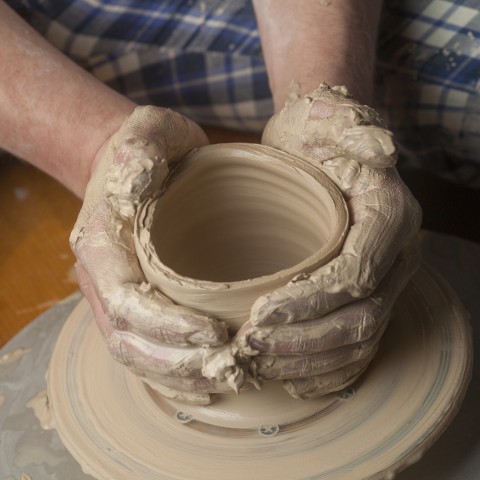
6. Traditional Turkish Holidays
Like in other cultures, holidays are a huge part of the Turkish culture and lifestyle. Turkish people celebrate two types of holidays: national and religious.
A- National Holidays
There are several national holidays in Turkey throughout the year, including:
- Republic Day (October 29)
- Youth and Sports Day (May 19)
- National Sovereignty and Children’s Day (April 23)
- Victory Day (August 30)
During the national holidays, all official offices are closed and the cities are decorated with Turkish flags. You can also see flags hanging from the windows and balconies of houses and offices.
B- Religious Holidays
There are two moveable religious holidays every year.
Ramadan
Ramadan is the month when Muslims fast for thirty days, between the sunrise and the sunset of each day. A three-day holiday follows the month of Ramadan. During this holiday, people visit other family members, friends, etc. Younger ones kiss older ones’ right hand and then put it on their own foreheads; this is a symbol of respect. Candy, chocolate, and Turkish coffee are offered to visitors, and children are given money as allowance.
The Feast of Sacrifice
This holiday is four days long. Most households, if they can afford it financially, sacrifice an animal (usually a sheep) in a special ritual. The meat is shared with relatives and neighbors, with one third of the meat usually given to those who are in need. In addition to these special traditions, the same features of the Ramadan holiday apply to this one.
7. Other Cultural Highlights
To conclude, let’s go over a few more Turkish culture characteristics you should be familiar with before visiting the country!
A- Food and Beverages
Turkey’s food culture is a major component of both daily life and special occasions. I’m sure you’re already well aware of the grand reputation Turkish cuisine has made for itself, so I’ll only list some of the most outstanding food and drink items here. But if you would like to know more about Turkish food, you can visit our lesson “How is the Turkish Food?“
- Döner kebap. This is seasoned meat cooked on a vertical rotisserie.
- Yaprak sarma. This consists of grape leaves stuffed with spicy rice or spicy ground meat.
- Baklava. This famous Turkish dessert is something that I highly recommend.
As for beverages, rakı is an alcoholic beverage which is consumed quite a bit in Turkey. It is similar to ouzo.
Another thing I should mention is that Turkish tea culture is alive and well! Turkish people drink tea many times a day, and anytime of day!
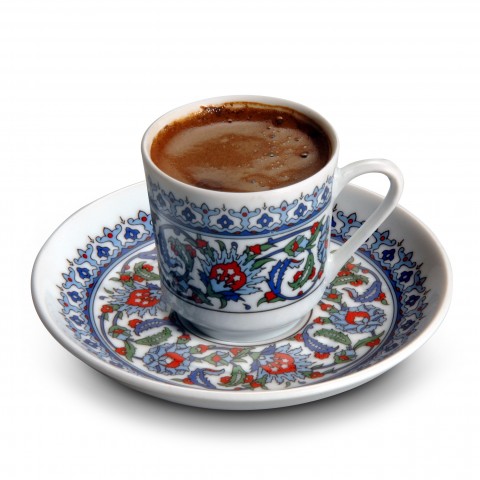
Turkish coffee is another big part of the culture. It’s usually preferred after meals. While talking about Turkish coffee, I must also mention coffee cup reading: usually, when women get together and drink coffee, they ask each other to do the cup reading. It’s a lot of fun to make sense of the shapes formed from the coffee grout.
B- Gestures
Turkish people use quite a number of gestures. Let me just give you a few examples:
1. If a person puts his/her fingers together with the thumb and moves the hand back and forth, it means “good” or “delicious.”
2. Raising the chin up, sometimes with the eyebrows up, means “no.”
3. If a person holds his/her hand next to his/her head and moves the hand like they’re unscrewing a light bulb, then he/she is calling someone “crazy.”
C- Superstitions
Here are just a few Turkish superstitions:
1. Turkish people are usually concerned about being coveted. However, people believe that a blue bead called nazar boncuğu protects them from ‘evil eyes.’ These beads are used in homes, offices, and cars, and are also used as a decorative object. Furthermore, they are used on earrings, necklaces, bracelets, and other forms of jewelry.
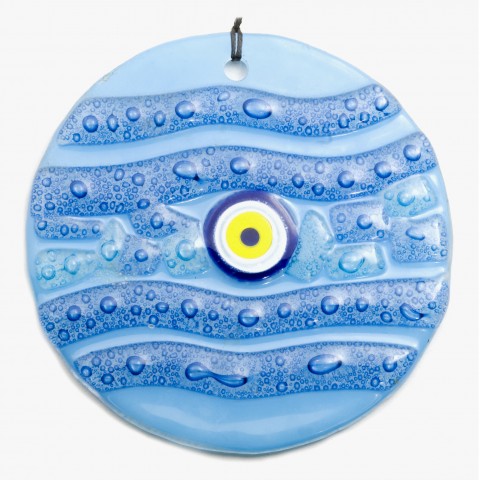
2. Some people believe seeing a black cat brings bad luck.
3. Some think a broken mirror brings seven years of bad luck.
8. Final Thoughts
In this lesson, you learned a variety of useful Turkish culture facts. But there’s a lot more to know!
To get a better grasp of the Turkish language and culture, visit TurkishClass101.com. We provide numerous audio recordings, tons of vocabulary lists, and other free resources including a Turkish-English dictionary for easy reference.
By signing up for a Premium PLUS account, you can also take advantage of our MyTeacher service. You’ll be able to study and practice with your own private tutor, who will give you assignments, answer questions, and help you improve your pronunciation.
Download the app for free and use it wherever you are.
Before you go, let us know in the comments how Turkish culture compares to that in your country. We look forward to hearing from you!

Emek ve Dayanışma Günü: Labor and Solidarity Day in Turkey
On Labor and Solidarity Day, Turkey’s workers celebrate gains made for laborers’ rights, demonstrate for even more rights, and take the day (or long weekend) off of work. In this article, you’ll learn all about Labor Day events in Turkey, some background information about the holiday, and a few useful vocabulary words.
Let’s get started.

1. What is Labor and Solidarity Day?
Labor Day in Turkey has had a rocky history since its start in 1923. Like in many countries around the world, Labor Day is a holiday dedicated to workers and laborers, and is often marked by protests and demonstrations. The first Labor Day celebration turned violent, causing authorities to place a yasak (“ban” ) on demonstration participation. In 1924, people participated anyway, so the holiday itself was banned until 1935 (when it returned with the name “Spring and Flowers Day”).
From this date on, Labor Day was celebrated peacefully until 1977, when a massive protest in Taksim Square turned violent. During the Confederation of Revolutionary Trade Union‘s president’s speech, someone opened fire in the crowd and then started shooting from one of the rooftops around the square. As a result of the stampede, several people were killed and injured.
In 1981, the holiday was banned yet again until 2009, when it returned as “Labor and Solidarity Day.”
In 2013, another incident took place in Taksim, where demonstrations were banned in Taksim Square, with a pedestrianization project given as the reason. It was advertised under the name “Taksim Urban Transformation Project” and was introduced to increase revenue. The polis (“police” ) used tear gas and water cannons against demonstrators who went ahead with their celebrations of the day anyway.
-
→ Check out our vocabulary list for Jobs / Work to pick up some useful words.
2. When is Labor Day?
Each year, Turks celebrate Labor Day on May 1. This is the same date most of the world celebrates, except for the United States, which celebrates on the first Monday in September.
-
→ Learn about the Top 5 Most Important Dates on the Turkish Calendar with us!
3. Labor Day in Turkish Culture: Celebrations & Traditions
On Labor Day, Turkey’s streets are often filled with marches and protests regarding insan hakları (“human rights” ) and işçi hakları (“labor rights” ). In 2019, events were mainly peaceful, and people observed Labor Day with songs, chants, and a moment of silence for five people who were killed in a traffic wreck on their way to a Labor Day event.
In Turkey, Labor Day is also a time for rest and relaxation for those who opt to stay at home or go out to quieter places with loved ones.
Depending on when May 1 is in a given year, there may be a full Labor Day weekend! For those not demonstrating, this is just a relaxing and fun holiday weekend off from work.
-
→ See our vocabulary list on the Top 10 Weekend Activities to discover what Turks may do on a Labor Day weekend!
4. 2003 Labor Act
In 2003, a Labor Act was passed in Turkey, which enacted certain laws regarding labor. For example:
- A 45-hour workweek (with fifty percent extra pay for overtime)
- Fourteen days of paid leave for full-time laborers employed for at least one year
- Minimum age of fifteen years for full-time employment
5. Must-Know Vocabulary for Labor and Solidarity Day
Ready to review some of the vocabulary words from this lesson? Here’s a list of the most important words and phrases for Labor Day in Turkey!
- Emek ve Dayanışma Günü — “Labor and Solidarity Day” [n.]
- Miting — “Demonstration” [n.]
- Yasak — “Ban” [n.]
- Protesto yürüyüşü — “Protest march”
- Emekçi — “Proletarian” [adj.]
- Polis — “Police” [n.]
- Biber gazı — “Pepper spray”
- Hürriyet — “Liberty” [n.]
- Işçi — “Laborer” [n.]
- Işçi hakları — “Labor rights”
- Adalet — “Justice” [n.]
- Insan hakları — “Human rights”
- Tutuklamak — “Arrest” [v.]
To hear the pronunciation of each word and phrase, and to read them alongside relevant images, be sure to check out our Turkish Labor and Solidarity Day vocabulary list!
Final Thoughts
We hope you enjoyed learning about Labor and Solidarity Day, Turkey’s history regarding this holiday, and some provisions of the 2003 Labor Act.
Do you celebrate Labor Day in your country? How do traditions there differ from those in Turkey? We look forward to hearing from you in the comments!
If you want to learn even more about Turkish culture or the language, you may find the following pages useful:
- Celebrating International Women’s Day in Turkey
- Holidays in Turkey: Atatürk Remembrance Day
- Best Turkish Movies for Learning Turkish
- The Turkish Calendar: Talking About Dates in Turkish
- Learn How to Talk About Your Family in Turkish
This is just the tip of the iceberg. For more fantastic Turkish-learning content, create your free lifetime account on TurkishClass101.com today. You can also upgrade to our Premium or Premium PLUS plans for exclusive lessons and content to help you learn Turkish faster.
Happy Labor Day, and good luck with your studies! 🙂

Holidays in Turkey: Atatürk Remembrance Day
Every year, the Turkish people commemorate one of the greatest leaders the country has known: Mustafa Kemal Ataturk. In this article, you’ll learn about how Turkey honors Ataturk’s memory, and explore some of Ataturk’s contributions to Turkey—and the world. In short, you’ll gain a clear picture of what the Turkish people remember Ataturk for, and why it’s significant.
As any successful language-learner can tell you, understanding a country’s culture is a step you can’t miss!
At TurkishClass101.com, we hope to make every aspect of your language-learning journey both fun and informative! Let’s get started, and delve into this Turkish national holiday.

1. What is Atatürk Remembrance Day?
Mustafa Kemal Atatürk passed away of cirrhosis on November 10, 1938, at 09:05 in Dolmabahçe Palace. His casket, draped in a flag, was placed on a catafalque for a moment, while residents of Istanbul mourned deeply. Following the funeral prayer and cortege, during his mausoleum’s construction, Atatürk rested in a marble tomb in the Ethnography Museum of Ankara for fifteen years. After the completion of Anıtkabir, his casket was transferred to his final resting place.
Mustafa Kemal Atatürk was not only an extraordinary leader and a revolutionary officer, who advocated peace, democracy, secularism, basic rights, and freedom, but he was also an academic research enthusiast. Even though today he might be considered to be ultra-nationalistic by some, he has always been admired and respected internationally as a leader, for his long-sightedness, ideas, and military achievements. One of his most famous sayings summarizes his ideas: “Peace at home, peace in the world.”
Mustafa Kemal was granted his surname, which is the combination of the words “father” and “Turk,” by the parliament right after the surname law in 1934.
2. When is Ataturk Commemoration Day?
Turks celebrate Ataturk Remembrance Day each year on November 10, the date of this beloved figure’s death.
3. Ataturk Memorial Day Traditions & Celebrations
Every year on November 10 at exactly 09:05, sirens sound throughout the country. All traffic stops, drivers and travelers get out of their vehicles, and people in their offices take a break and stand up. In schools, students will already be expecting this time and join the rest of the country.
Life stops at this time, and while the sirens wail, everybody in the country stands up as a gesture of respect. Following the sirens, in schools and government agencies, people sing the National Anthem.
4. Six Important Ataturk Principles
Can you name the six principles of Atatürk’s that have affected recent Turkish history?
These principles are:
- Republicanism
- Populism
- Secularism
- Reformism
- Nationalism
- Statism
5. Must-Know Vocabulary for Ataturk Remembrance Day
Here’s some essential vocabulary for Ataturk Remembrance Day!
- Mustafa Kemal Atatürk — “Mustafa Kemal Ataturk”
- Türk Bayrağı — “Turkish flag”
- Anıtkabir’e çelenk koymak — “Place a wreath on the Mausoleum of Ataturk”
- Yas tutma — “Mourning”
- Saygı duruşu — “Moment of silence”
- Askeri geçit — “Military parade”
- Bayrak asmak — “Fly a flag”
- Bayrak sallama — “Flag-waving”
- Anma töreni — “Commemorative ceremony”
- Atatürk büstü — “Bust of Ataturk”
- Atatürk rozeti — “Ataturk badge”
- İstiklal Marşı — “Turkish National Anthem”
- Anıtkabir — “The Mausoleum of Ataturk”
To hear the pronunciation of each word, and to see them accompanied by relevant images, visit our Ataturk Remembrance Day vocabulary list!
Final Thoughts
We hope you enjoyed learning about this Turkish national holiday with us!
Did you learn anything new? Does your country have a similar holiday celebrating a beloved historical figure? Let us know in the comments! We always look forward to hearing from you!
Being able to discover a country’s culture may be the most rewarding and exciting aspect of trying to master its language. If more cultural information is what you’re after, be sure to check out the following pages on TurkishClass101.com:
- After Ramadan: The Turkish Feast of Sacrifice
- Tourist Attractions in Turkey
- Turkish Pop & Traditional Culture
- 4 Reasons Why Turkish Slang Words Will Make You Fluent
- Top 20 Words You’ll Need for the Internet
For even more Turkish learning opportunities, be sure to create a free basic account today! By upgrading to Premium Plus, you can further accelerate your learning with your own personal Turkish tutor. You really can master the language, and we’ll be here with constant support and effective learning materials every step of the way!
Happy Turkish learning!

After Ramadan: The Turkish Feast of Sacrifice
Once a year, about seventy days after Ramadan ends, Muslims in Turkey observe the Muslim Feast of Sacrifice. The main event of this holiday is the sacrifice of an animal, which is then distributed, cooked, and eaten.
In this article, we’ll go over more details about the Islamic Feast of Sacrifice and introduce you to the Sacrifice Feast meaning. Learning about the Sacrifice Feast in Turkey will show you much about Turkish culture as a whole, as well as the religion practiced by Muslims living here.
At TurkishClass101.com, we hope to make this learning journey both fun and informative!

1. What is the Sacrifice Feast?
The Sacrifice Feast Feast is one of the oldest Islamic holidays celebrated in Turkey. As cited in other monotheistic religions, the Feast of Sacrifice Muslims observe commemorates the story of Prophet Abraham agreeing to sacrifice his son, to prove his loyalty to God. Seeing his devotion, God sent him a ram to sacrifice instead. The festival’s eve is called ‘Arefe’ and offices close for the half day. All government offices, private companies, and schools are closed for four days.
2. When is the Sacrifice Feast?
The Eve of the Sacrifice Feast takes place on a different date each year, as it’s about seventy days after Ramadan. For your convenience, we’ve prepared a list of this holiday’s start date for the next ten years.
- 2019: August 10
- 2020: July 30
- 2021: July 19
- 2022: July 9
- 2023: June 28
- 2024: June 16
- 2025: June 6
- 2026: May 26
- 2027: May 16
- 2028: May 4
3. Reading Practice: Sacrifice Feast Traditions
What do Sacrifice Feast traditions look like in Turkey? Read the Turkish text below to learn about the Feast of Sacrifice Islamic celebrations, and find the English translation directly below it.
—
Geleneksel olarak, kurban bayramının ilk günü erkeklerin bayram namazına katılmalarından sonra koç, kuzu veya boğadan oluşan hayvanların kurban ritüeli başlar. Genelde kurbanlığın alnına kınadan yapılma bir boya sürülür ve kurdelelerle süslenir. Kesilen kurban etinin üçte biri fakirlere, üçte biri akrabalara dağıtılır, geri kalan da aile tarafından bayram boyunca gelen misafirlere ikram edilmek için hazırlanır.
Kurban Bayramında da Ramazanda olduğu gibi aile büyükleri ziyaret edilir, el öpülür ve çocuklara bayram harçlığı verilir. Ramazan bayramından farklı olarak tatlılara değil etli yemeklere ağırlık verilir. Evlerde, kavurma, etli türlü, etli yaprak sarma, kıymalı börek gibi yemekler pişer ve gelen misafirlere ikram edilir. Kurban derileri Türk Hava Kurumu, Türk Kızılayı gibi sosyal yardımlaşma kurumlarına bağışlanır.
Bu bayram haricinde, aileler bir başarı veya başlarından geçmiş kaza, hastalık gibi elim bir olay sonrası, Allah’a şükran duymak için de kurban keserler. Buna adak denir.
—
Traditionally, on the first day of the Turkish Sacrifice Feast, men go to a mosque for a special morning prayer, which is followed by the ritual sacrifice of rams, lambs, and bulls. In some regions in Turkey, people paint the sacrificial animal’s forehead with henna and adorn it with ribbons. Families share about one-third of the animal’s meat with relatives and neighbors and traditionally give about one third to the poor, whilst the rest is cooked and served to guests during the holidays.
During the Feast of Sacrifice, just like Ramadan, people visit their older relatives and greet them by kissing their hands, then they give the children money. Unlike Ramadan, people serve meat-based dishes, rather than desserts. Fried meat, stews, vine leaves stuffed with minced meat, minced meat pastries, and the like are cooked and served to guests. The skins of the sacrificial animals are donated to charitable organizations such as the Turkish Aeronautical Association, and the Turkish Red Crescent.
Apart from this festivity, people who have experienced success, or recovered from an accident or illness will also sacrifice an animal to show their gratitude to Allah. This is called an offering.
4. The Sacrifice
In Turkey, who performs the sacrifice and where does this it place?
In Turkey, the sacrifices are carried out by professionals assigned by municipalities in designated areas where the process can be monitored and controlled.
5. Vocabulary You Need to Know for the Sacrifice Feast
Here’s some vocabulary you should know the Turkish Sacrifice Feast!
- Akrabaları ziyaret etmek — “Visit relatives”
- Dini bayram — “Religious holiday”
- Sofra donatmak — “Prepare a lavish feast”
- Müslüman — “Muslim”
- Misafir ağırlamak — “Do the honors”
- Kurban eti dağıtmak — “Distribution of the sacrificial meat”
- Arife günü — “Day of Arafa”
- Bayram namazı — “Bayram prayer”
- El öpmek — “Kiss one’s hand”
- Kurbanlık — “Sacrificial”
- Kurban kesmek — “Sacrifice”
- Fakirlere yardım etmek — “Help the poor”
- Kurban Bayramı — “Sacrifice feast”
To hear each of these Sacrifice Feast vocabulary words pronounced, check out our relevant vocabulary list!
Conclusion: How TurkishClass101 Can Help You Master Turkish
We hope you enjoyed learning about the Turkish Sacrifice Feast with us! Did you learn anything new? Let us know in the comments; we love hearing from you!
At TurkishClass101.com, we have an array of practical learning tools just waiting for you. Read more insightful blog posts like this one, study up with our free Turkish vocabulary lists, and upgrade to Premium Plus to take advantage of our MyTeacher program!
Whatever your reasons for wanting to learn Turkish, know that with enough hard work and determination, you can master the language and become knowledgeable in Turkish culture. And TurkishClass101.com will be here with you on each step of your journey there!

How to Say Happy New Year in Turkish & New Year Wishes
Learn all the Turkish New Year wishes online, in your own time, on any device! Join TurkishClass101 for a special Turkish New Year celebration!
Can you relate to the year passing something like this: “January, February, March – December!”? Many people do! Quantum physics teaches us that time is relative, and few experiences illustrate this principle as perfectly as when we reach the end of a year. To most of us, it feels like the old one has passed in the blink of an eye, while the new year lies ahead like a very long journey! However, New Year is also a time to celebrate beginnings, and to say goodbye to what has passed. This is true in every culture, no matter when New Year is celebrated.
So, how do you say Happy New Year in Turkish? Let a native teach you! At TurkishClass101, you will learn how to correctly greet your friends over New Year, and wish them well with these Turkish New Year wishes!

Table of Contents
- How to Celebrate New Year in Turkey
- Must-Know Turkish Words & Phrases for the New Year!
- Top 10 New Year’s Resolutions in Turkish
- Inspirational New Year Quotes
- Inspirational Language Learning Quotes
- How To Say Happy New Year in 31 Languages
- How TurkishClass101 Can Help You Learn Turkish
But let’s start with some vocabulary for Turkish New Year celebrations, very handy for conversations.
1. How to Celebrate New Year in Turkey
In Turkey, New Year’s Eve is a flashy celebration with a festive dinner, bingo games, oriental belly dance shows and decorated Christmas trees. Like most of the countries in the world, Turkey enters the new year after 12:00 AM on the night between December 31 and January 1.
Now, before we get into more detail, we have a question for you-
How do most people decorate their homes to prepare for New Year’s Eve and which myth is this tradition it’s based on?
If you don’t already know, you’ll find out a bit later. Keep reading.
New Year’s Eve, in Turkish yılbaşı, is traditionally celebrated at home in Turkey. People consider New Year’s Eve a day for gathering with their relatives, neighbors and close friends. New Year’s Eve dinner is fascinating. Dinner includes turkey with chestnut stuffing, pilaf with chicken and nuts, pastries, and several side dishes and desserts. New Year’s Eve dinner in Turkey is generally rather flamboyant and is served using the best dinner set and table ornaments available in the household. Dried fruit roll-up, in Turkish called cevizli sucuk, snacks and fruits are also served to guests before and after dinner.
As New Year’s Day is considered a family holiday in Turkey, every member of the family, regardless of their age, gets involved and has fun. Especially after the New Year’s Eve dinner, games like rummikub, backgammon, card games and bingo are enjoyed by all. The TV is generally kept on, and families will sit together and watch belly dance shows, in Turkish oryantal dans gösterisi, and sometimes people in the house also try their hand at a bit of the dance! Even if in the cities families celebrate New Year’s Day with the activities mentioned before, many Turkish people choose not to celebrate New Year’s Day, as some consider it a Western Tradition that isn’t suitable for Turkish culture.
When one minute is left to the new year, the countdown, in Turkish geri sayım, starts on TV. People turn their lights off and set off their firecrackers. When mid-night strikes, firework shows, in Turkish havai fişek, take place in big cities such as Istanbul, Izmir and Ankara. Everyone hugs and kisses each other, and wishes each other a good year by saying “Happy New Year”, in Turkish Mutlu yıllar. Presents are exchanged along with new year’s greetings. Children especially anxiously await this moment, knowing it’s when they will receive their long-awaited presents.
There are also some interesting superstitions regarding New Year’s in Turkey. For example, some people believe cracking a pomegranate, or nar, in front of the door at 12:00 AM on New Year’s Day will bring prosperity and good luck in the coming year.
Now it’s time to answer our quiz question-
How do people decorate their homes to prepare for New Year’s Eve and which myth is this tradition based on?
They prepare for New Year’s Day by decorating an artificial or real Christmas tree and putting presents under it. This tradition is not particularly related to Christmas from a religious perspective. Among the Turks there used to be an ancient cult revolving around a secret wishing tree, and its believed that this is where the tradition of decorating Christmas trees originated from!
Happy New Year!
Mutlu yıllar!
2. Must-Know Turkish Words & Phrases for the New Year!
1- Year
yıl
This is pretty self-explanatory. Most countries follow a Gregorian calendar, which has approximately 365 days in a year, while in some cultures, other year designations are also honored. Therefore, New Year’s day in Turkey could fall on a different day than in your country. When do you celebrate New Year?
2- Midnight
gece yarısı
The point in time when a day ends and a new one starts. Many New Year celebrants prefer to stay awake till midnight, and greet the new annum as it breaks with fanfare and fireworks!
3- New Year’s Day
Yeni yılın ilk günü
In most countries, the new year is celebrated for one whole day. On the Gregorian calendar, this falls on January 1st. On this day, different cultures engage in festive activities, like parties, parades, big meals with families and many more.
4- Party
parti
A party is most people’s favorite way to end the old year, and charge festively into the new one! We celebrate all we accomplished in the old year, and joyfully anticipate what lies ahead.
5- Dancing
dans etme
Usually, when the clock strikes midnight and the New Year officially begins, people break out in dance! It is a jolly way to express a celebratory mood with good expectations for the year ahead. Also, perhaps, that the old year with its problems has finally passed! Dance parties are also a popular way to spend New Year’s Eve in many places.
6- Champagne
şampanya
Originating in France, champagne is a bubbly, alcoholic drink that is often used to toast something or someone during celebrations.
7- Fireworks
havai fişek
These are explosives that cause spectacular effects when ignited. They are popular for announcing the start of the new year with loud noises and colorful displays! In some countries, fireworks are set off to scare away evil spirits. In others, the use of fireworks is forbidden in urban areas due to their harmful effect on pets. Most animals’ hearing is much more sensitive than humans’, so this noisy display can be very frightful and traumatising to them.
8- Countdown
geri sayım
This countdown refers to New Year celebrants counting the seconds, usually backward, till midnight, when New Year starts – a great group activity that doesn’t scare animals, and involves a lot of joyful shouting when the clock strikes midnight!
9- New Year’s Holiday
Yeni Yıl Tatili
In many countries, New Year’s Day is a public holiday – to recuperate from the party the previous night, perhaps! Families also like to meet on this day to enjoy a meal and spend time together.
10- Confetti
konfeti
In most Western countries, confetti is traditionally associated with weddings, but often it is used as a party decoration. Some prefer to throw it in the air at the strike of midnight on New Year’s Eve.
11- New Year’s Eve
Yılbaşı gecesi
This is the evening before New Year breaks at midnight! Often, friends and family meet for a party or meal the evening before, sometimes engaging in year-end rituals. How are you planning to give your New Year greetings in 2018?
12- Toast
kadeh kaldırma
A toast is a type of group-salutation that involves raising your glass to drink with others in honor of something or someone. A toast to the new year is definitely in order!
13- Resolution
tebrik
Those goals or intentions you hope to, but seldom keep in the new year! Many people consider the start of a new year to be the opportune time for making changes or plans. Resolutions are those intentions to change, or the plans. It’s best to keep your resolutions realistic so as not to disappoint yourself!
14- Parade
geçit töreni
New Year celebrations are a huge deal in some countries! Parades are held in the streets, often to celebratory music, with colorful costumes and lots of dancing. Parades are like marches, only less formal and way more fun. At TurkishClass101, you can engage in forums with natives who can tell you what Turkish New Year celebrations are like!
3. Top 10 New Year’s Resolutions
So, you learned the Turkish word for ‘resolution’. Fabulous! Resolutions are those goals and intentions that we hope to manifest in the year that lies ahead. The beginning of a new year serves as a good marker in time to formalise these. Some like to do it in writing, others only hold these resolutions in their hearts. Here are our Top 10 New Year’s resolutions at TurkishClass101 – what are yours?
Learn these phrases and impress your Turkish friends with your vocabulary.
1- Read more
Daha çok oku.
Reading is a fantastic skill that everyone can benefit from. You’re a business person? Apparently, successful business men and women read up to 60 books a year. This probably excludes fiction, so better scan your library or Amazon for the top business reads if you plan to follow in the footsteps of the successful! Otherwise, why not make it your resolution to read more Turkish in the new year? You will be surprised by how much this will improve your Turkish language skills!
2- Spend more time with family
Aileyle daha çok zaman geçir.
Former US President George Bush’s wife, Barbara Bush, was quoted as having said this: “At the end of your life, you will never regret not having passed one more test, not winning one more verdict, or not closing one more deal. You will regret time not spent with a husband, a friend, a child, a parent.” This is very true! Relationships are often what gives life meaning, so this is a worthy resolution for any year.
3- Lose weight
Kilo ver.
Hands up, how many of you made this new year’s resolution last year too…?! This is a notoriously difficult goal to keep, as it takes a lot of self discipline not to eat unhealthily. Good luck with this one, and avoid unhealthy fad diets!
4- Save money
Para biriktir.
Another common and difficult resolution! However, no one has ever been sorry when they saved towards reaching a goal. Make it your resolution to save money to upgrade your subscription to TurkishClass101’s Premium PLUS option in the new year – it will be money well spent!
5- Quit smoking
Sigarayı bırak.
This is a resolution that you should definitely keep, or your body could punish you severely later! Smoking is a harmful habit with many hazardous effects on your health. Do everything in your power to make this resolution come true in the new year, as your health is your most precious asset.
6- Learn something new
Yeni bir şeyler öğren.
Science has proven that learning new skills can help keep brain diseases such as dementia and Alzheimer’s at bay! It can even slow down the progression of the disease. So, keep your brain healthy by learning to speak a new language, studying towards a qualification, learning how to sew, or how to play chess – no matter how old you are, the possibilities are infinite!
7- Drink less
Daha az iç.
This is another health resolution that is good to heed any time of the year. Excessive drinking is associated with many diseases, and its effect can be very detrimental to good relationships too. Alcohol is a poison and harmful for the body in large quantities!
8- Exercise regularly
Düzenli egzersiz yap.
This resolution goes hand-in-hand with ‘Lose weight’! An inactive body is an unhealthy and often overweight one, so give this resolution priority in the new year.
9- Eat healthy
Sağlıklı beslen.
If you stick with this resolution, you will lose weight and feel better in general. It is a very worthy goal to have!
10- Study Turkish with TurkishClass101
TurkishClass101.com ile Türkçe çalışmak
Of course! You can only benefit from learning Turkish, especially with us! Learning how to speak Turkish can keep your brain healthy, it can widen your circle of friends, and improve your chances to land a dream job anywhere in the world. TurkishClass101 makes it easy and enjoyable for you to stick to this resolution.
4. Inspirational New Year Quotes
Everyone knows that it is sometimes very hard to stick to resolutions, and not only over New Year. The reasons for this vary from person to person, but all of us need inspiration every now and then! A good way to remain motivated is to keep inspirational quotes near as reminders that it’s up to us to reach our goals.
Click here for quotes that will also work well in a card for a special Turkish new year greeting!
Make decorative notes of these in Turkish, and keep them close! Perhaps you could stick them above your bathroom mirror, or on your study’s wall. This way you not only get to read Turkish incidentally, but also remain inspired to reach your goals! Imagine feeling like giving up on a goal, but reading this quote when you go to the bathroom: “It does not matter how slowly you go, as long as you do not stop.” What a positive affirmation!
5. Inspirational Language Learning Quotes
Still undecided whether you should enroll with TurkishClass101 to learn a new language? There’s no time like the present to decide! Let the following Language Learning Quotes inspire you with their wisdom.
Click here to read the most inspirational Language Learning Quotes!
As legendary President Nelson Mandela once said: “If you talk to a man in a language he understands, that goes to his head. If you talk to him in his own language, that goes to his heart.” So, learning how to say Happy New Year in Turkish could well be a way into someone special’s heart for you! Let this year be the one where you to learn how to say Happy New Year, and much more, in Turkish – it could open many and unexpected doors for you.
6. How To Say Happy New Year in 31 Languages
Here’s a lovely bonus for you! Why stop with Turkish – learn how to say Happy New Year in 31 other languages too! Watch this video and learn how to pronounce these New Year’s wishes like a native in under two minutes.
7. Why Enrolling with TurkishClass101 Would Be the Perfect New Year’s Gift to Yourself!
If you are unsure how to celebrate the New Year, why not give yourself a huge gift, and enroll to learn Turkish! With more than 12 years of experience behind us, we know that TurkishClass101 would be the perfect fit for you. There are so many reasons for this!
- Custom-tailored Learning Paths: Start learning Turkish at the level that you are. We have numerous Learning Pathways, and we tailor them just for you based on your goals and interests! What a boon!
- Marked Progress and Fresh Learning Material Every Week: We make new lessons available every week, with an option to track your progress. Topics are culturally appropriate and useful, such as “Learning how to deliver negative answers politely to a business partner.” Our aim is to equip you with Turkish that makes sense!
- Multiple Learning Tools: Learn in fun, easy ways with resources such 1,000+ video and audio lessons, flashcards, detailed PDF downloads, and mobile apps suitable for multiple devices!
- Fast Track Learning Option: If you’re serious about fast-tracking your learning, Premium Plus would be the perfect way to go! Enjoy perks such as personalised lessons with ongoing guidance from your own, native-speaking teacher, and one-on-one learning on your mobile app! You will not be alone in your learning. Weekly assignments with non-stop feedback, answers and corrections will ensure speedy progress.
- Fun and Easy: Keeping the lessons fun and easy-to-learn is our aim, so you will stay motivated by your progress!

There’s no reason not to go big in 2018 by learning Turkish with TurkishClass101. Just imagine how the world can open up for you!
How to Say ‘Merry Christmas’ in Turkish
Do you know any ways to wish someone a ‘Merry Christmas’ in Turkish? TurkishClass101 brings you easy-to-learn translations and the correct pronunciation of Turkish Christmas phrases!
Christmas is the annual commemorative festival of Christ’s birth in the Western Christian Church. It takes place on December 25th and is usually celebrated with much food and fanfare! However, not all cultures celebrate Christmas. In some countries, Christmas is not even a public holiday! However, many countries have adapted Christmas and its religious meaning to tally with their own beliefs, or simply in acknowledgment of the festival’s importance to other cultures. If you want to impress native Turkish speakers with culturally-appropriate Christmas phrases and vocabulary, TurkishClass101 will teach you the most important ways to wish someone a ‘Merry Christmas’ in Turkish!

Table of Contents
- Holiday Greetings and Wishes
- Must-Know Christmas Day Vocabulary
- Twelve Days of Christmas
- Top 10 Christmas Characters
- How TurkishClass101 Can Help You
1. Holiday Greetings and Wishes for the Holiday Season
1- Merry Christmas!
Mutlu Noeller.
Do you know how to say ‘Merry Christmas’ in Turkish? Learn here how to pronounce it perfectly! ‘Merry’ means to be joyful, to celebrate and generally be in good spirits. So, with this phrase you are wishing someone a joyful, celebratory remembrance of Christ’s birth!
2- Happy Kwanzaa!
Mutlu Kwanzaa!
Surprise your African-American, or West African native friends with this phrase over the Christmas holidays! Kwanzaa is a seven-day, non-religious celebration, starting on Dec 26th each year. It has its roots in African American modern history, and many people celebrate both Kwanzaa and Christmas!
3- Have a happy New Year!
Mutlu yıllar!
In countries where Christmas is not officially celebrated, but a Gregorian calendar is observed, this would be a friendly festive-season wish over New Year.
4- Happy Hanukkah!
Hanuka Bayramı’nız kutlu olsun!
Hanukkah is the beautiful Hebrew festival over November or December each year. It is also called the ‘Festival of Lights’ and is celebrated to commemorate the Jewish freedom of religion.
5- Have a great winter vacation!
Umarım çok iyi bir kış tatili geçirirsin!
This is a good phrase to keep handy if someone doesn’t observe any religious festival over the Christmas holidays! However, this will only be applicable in the Northern hemisphere, where it is winter over Christmas.
6- See you next year!
Gelecek yıl görüşürüz!
Going away on holiday over Christmas season, or saying goodbye to someone about to leave on vacation? This would be a good way to say goodbye to your friends and family.
7- Warm wishes!
Kendine iyi bak!
An informal, friendly phrase to write in Turkish Christmas cards, especially for secular friends who prefer to observe Christmas celebrations without the religious symbolism. It conveys the warmth of friendship and friendly wishes associated with this time of year.
8- Happy holidays!
İyi tatiller!
If you forget how to say ‘Merry Christmas!’ in Turkish, this is a safe, generic phrase to use instead.
9- Enjoy the holidays!
Tatil keyfini çıkarın!
After saying ‘Merry Christmas’ in Turkish, this would be a good phrase with which to wish Christmas holiday-goers well! It is also good to use for secular friends who don’t celebrate Christmas but take a holiday at this time of the year.
10- Best wishes for the New Year!
Yeni yıl için en iyi dileklerimle!
This is another way of wishing someone well in the New Year if they observe a Gregorian calendar. New Year’s day would then fall on January 1st.
2. Must-Know Christmas Day Vocabulary
Christmas is associated with many traditions and religious symbols in multiple countries across the world. It originated centuries ago in the West with the birth of Christianity, and the celebrations are often embedded with rich cultural significance. So, by now you know how to say Merry Christmas in Turkish! Next, learn pertinent vocabulary and phrases pertaining to Christmas, as well as how to pronounce them correctly. At TurkishClass101, we make sure you sound like a native speaker!
1- Christmas
Noel
This is the Turkish word for ‘Christmas’. Most happy Christmas wishes in Turkish will include this word!
2- Snow
kar
In most Northern-hemisphere countries, Christmas is synonymous with snow, and for Christmas, the snowman is often dressed as Santa Claus.
3- Snowflake
kar tanesi
Snowflakes collectively make up snow. A single snowflake is small, white, light like a feather and icy cold! When put under a microscope, the snowflake reveals itself to have the most beautiful, symmetrical patterns. These patterns have become popular Christmas decorations, especially in Western countries.
4- Snowman
kardan adam
As you guessed – a snowman is only possible to build if it is snowing! What a fun way to spend Christmas day outside.
5- Turkey
hindi
Roast turkey is the traditional main dish on thousands of lunch tables on Christmas day, mainly in Western countries. What is your favorite Christmas dish?
6- Wreath
çelenk
Another traditional Western decoration for Christmas, the wreath is an arrangement of flowers, leaves, or stems fastened in a ring. Many families like to hang a Christmas wreath outside on their houses’ front doors.
7- Reindeer
ren geyiği
Reindeer are the animals commonly fabled to pull Santa Claus’ sled across the sky! Western Christmas folklore tells of Father Christmas or Santa Claus doing the rounds with his sled, carrying Christmas presents for children, and dropping them into houses through the chimney. But who is Santa Claus?
8- Santa Claus
Noel Baba
Santa Claus is a legendary and jolly figure originating in the Western Christian culture. He is known by many names, but is traditionally depicted as a rotund man wearing a red costume with a pointy hat, and sporting a long, snow-white beard!
9- Elf
cin
An elf is a supernatural creature of folklore with pointy ears, a dainty, humanoid body and a capricious nature. Elves are said to help Santa Claus distribute presents to children over Christmas!
10- Rudolph the Red-Nosed Reindeer
kırmızı burunlu ren geyiği Rudolf
‘Rudolph the Red-Nosed Reindeer’ is a Christmas song based on an American children’s story book with the same name. Rudolph is one of Santa’s reindeer. The song became more famous than the book, and can still be heard playing in many shopping malls over Christmas time across the globe!
11- North Pole
Kuzey kutbu
The cold North Pole is where Santa Claus is reputed to live with his reindeer!
12- Sled
kızak
A sled is a non-motorised land vehicle used to travel over snow in countries where it snows a lot, and is usually pulled by animals such as horses, dogs or reindeer. This one obviously refers to Santa’s sled! Another word for sled is sleigh or sledge.
13- Present
hediye
Gift or present giving is synonymous with Christmas Eve and the greatest source of joy for children over this festive time! This tradition signifies that Christ’s birth was a gift to mankind, but not all people who hand out presents over Christmas observe the religious meaning.
14- Bell
çan
On Christmas Day, or Christmas Eve, many religious celebrants enjoy going to church for a special sermon and Christmas rituals. The start of the sermon is often announced with bells or a bell, if the church has one. For this reason, the sound of ringing bells is often associated with Christmas Day.
15- Chimney
baca
The chimney is the entrance Santa Claus uses to deliver children’s presents on Christmas Day, according to folklore! Wonder how the chubby man and his elves stay clean…?!
16- Fireplace
şömine
In most countries where it snows, Christmas is synonymous with a fire or burning embers in houses’ fireplaces. Families huddle around its warmth while opening Christmas presents. Also, this is where Santa Claus is reputed to pop out after his journey down the chimney!
17- Christmas Day
Noel günü
This is the official day of commemorative celebration of Christ’s birth, and falls each year on December 25.
18- Decoration
süsleme
Decorations are the colourful trinkets and posters that make their appearance in shops and homes during the Christmas holiday season in many countries! They give the places a celebratory atmosphere in anticipation of the big Christmas celebration. Typical Christmas decorations include colorful photographs and posters, strings of lights, figurines of Santa Claus and the nativity scene, poinsettia flowers, snowflakes and many more.
19- Stocking
çorap
According to legend, Santa Claus places children’s presents in a red stocking hanging over the fireplace. This has also become a popular decoration, signifying Christmas.
20- Holly
çobanpüskülü
Holly is a shrub native to the UK, and parts of Europe, Africa and Asia. It is characterised by glossy, spiny-toothed leaves, small, whitish flowers, and red berries. Ironically, its significance for Christmas relates to Christ’s crucifixion and suffering rather than his birth. However, the leaves’ distinctive shape and image have become popular Christmas decorations.
21- Gingerbread house
zencefilli ev
According to legend, the gingerbread house synonymous with Christmas is related to Christ’s birth place, Bethlehem. Bethlehem literally means ‘House of Bread’. Over centuries, it has become a popular treat over Christmas time in many non-religious households as well.
22- Candy cane
şeker kamışı
According to folklore, Christmas candy canes made their appearance first in Germany in the 16th century. A choir master gave children the candy canes to suck on in church in order to keep them quiet during the Christmas sermon! Apparently, the candy is shaped like a cane in remembrance of the shepherds who were the first to visit the baby Jesus. Today, like gingerbread houses, they are still a popular sweet over the festive season!
23- Mistletoe
ökseotu
Mistletoe is a parasitic plant that grows on certain trees. In the Middle Ages, it was believed that the mistletoe has magical powers, and could protect a household from evil if hung above a door during December. The belief didn’t last but the habit did, and the mistletoe is another popular Christmas decoration!
3. Twelve Days of Christmas
Wow, you’re doing extremely well! You know how to wish someone a Merry Christmas in Turkish, and you learned pertinent vocabulary too! The Twelve Days of Christmas is not very well known in modern times, so, you’re on your way to becoming an expert in Christmas traditions and rituals. Well done!
The Twelve Days of Christmas, also known as Twelvetide, is a traditional festive period of 12 days dedicated to celebrate the nativity of Christ. Christmas Day is, for many who observe Twelvetide, the first day of this period.
‘The Twelve Days of Christmas’ is also a popular Christmas song about a series of gifts given on each day of Twelvetide. According to experts, these gifts were created as a coded reference to important symbols in the Christian church. Here is a list of those gifts mentioned in the song! Do you recognise them?
4. Top 10 Christmas Characters in American Culture
This is fantastic, you know how to explain almost everything about Christmas in Turkish! However, do you know the most popular Christmas characters in American culture? Your knowledge will not be complete without this list.
5. TurkishClass101 Is One Of The Best Online Language Schools Available!
We don’t just say this – we can prove it! Geared to your personal needs and goals, we have several learning paths from which to choose. From Turkish for Absolute Beginners to Advanced Turkish, lessons are designed to meet you where you are, and increase your language abilities in fun, easy and interactive lessons! Mastering a new language has never been this easy or enjoyable.
We have over a decade of experience and research behind us, and it shows! With thousands of audio and video lessons, detailed PDF lessons and notes, as well as friendly, knowledgeable hosts, TurkishClass101 is simply unbeatable when it comes to learning correct Turkish. Plenty of tools and resources are available when you study with us. New lessons are added every week so material remains fresh and relevant. You also have the option to upgrade and enjoy even more personalised guidance and services. This is a sure way to fast-track your learning!
So, this Christmas, why don’t you give yourself a present and enroll in TurkishClass101? Or give an enrollment as a present to a loved one. It will be a gift with benefits for a whole lifetime, not just over Christmas!













